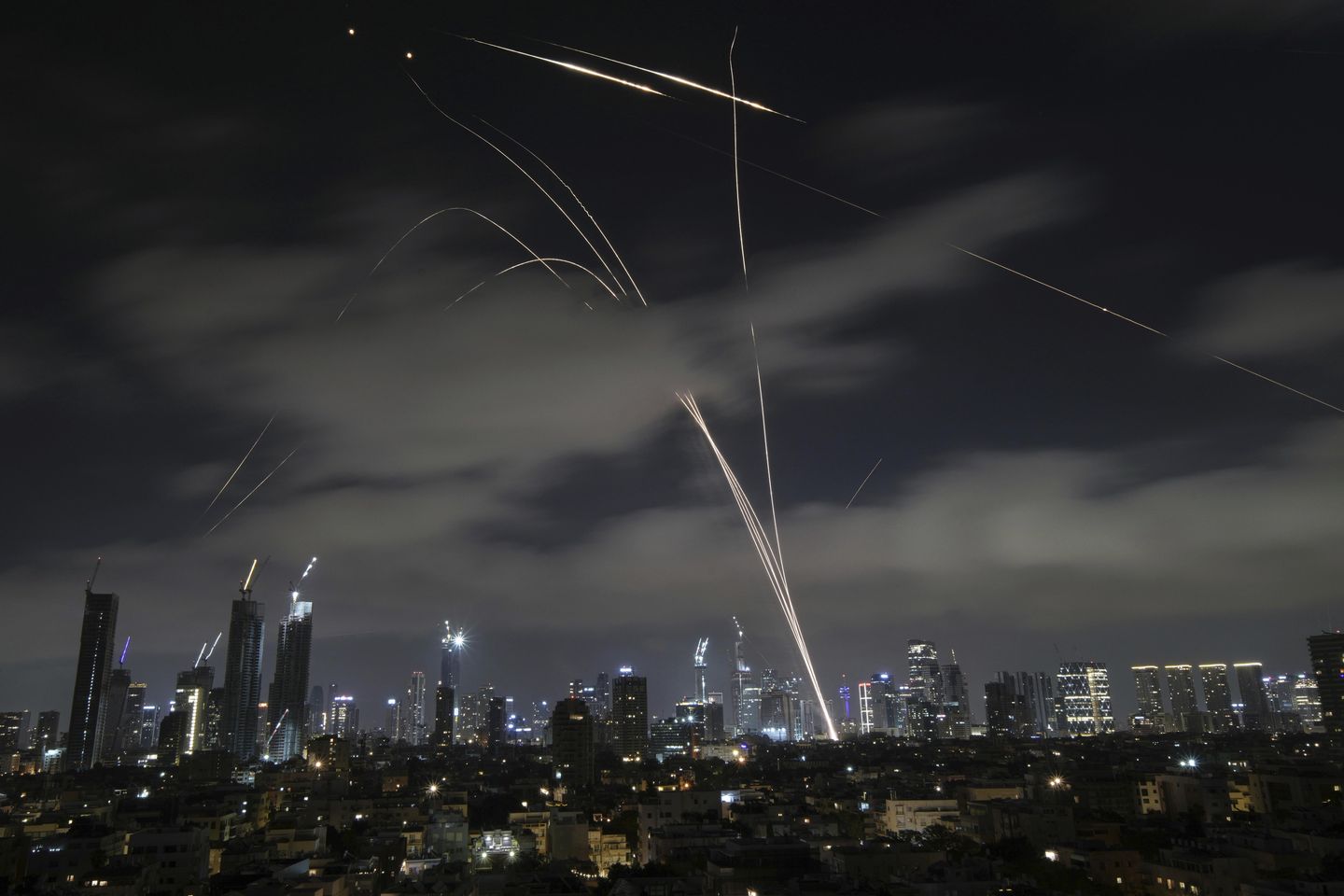
The war between Israel and Iran intensified through the weekend, with Iranian missiles penetrating Israeli air defenses and Israel carrying out a brazen daytime assault on Tehran as world powers, including the United States and China, jockeyed on Sunday for influence over the direction the escalating conflict will take in the days to come.
President Trump toed a cautious line, warning that American forces could get involved if the war spirals, but also appearing to try to distance the U.S. from Israel’s campaign, with several news organizations reporting that the American president had privately vetoed an Israeli plot to assassinate Iran’s elderly supreme leader.
The president warned Iran not to strike American interests in retaliation for Israel’s attacks. He also expressed openness to the prospect that Russian President Vladimir Putin could play a constructive role in defusing the conflict.
The mix of comments from Mr. Trump came a day after Chinese Foreign Minister Wang Yi held separate phone calls with Israeli and Iranian officials. Beijing, which has emerged as a key strategic partner of Iran in recent years and leads the world in Iranian oil purchases, has sharply criticized Israel for attacking Iran.
A Chinese foreign ministry statement said Mr. Wang told Iranian Foreign Minister Abbas Araghchi on Saturday that Beijing would support Tehran in “safeguarding its national sovereignty, defending its legitimate rights and interests, and ensuring the safety of its people.”
“Israel’s attacks on Iran’s nuclear facilities have set a dangerous precedent with potentially catastrophic consequences,” Mr. Wang said in comments that alluded to the potential for a global conflict erupting from the dynamics now unfolding in the Middle East.
There is a consensus in some American national security circles that China and Russia, as well as North Korea, would back Tehran against the U.S., Israel and other Western allies should the situation spiral into a world war.
The prospect of such an alignment hung in the backdrop as Mr. Trump asserted in a posting on social media at 12:32 a.m. on Sunday that “the U.S. had nothing to do with the attack on Iran, tonight.”
“If we are attacked in any way, shape or form by Iran, the full strength and might of the U.S. Armed Forces will come down on you at levels never seen before,” the president wrote. “However, we can easily get a deal done between Iran and Israel, and end this bloody conflict!!!”
Nuclear talks between U.S. and Iranian officials that had been scheduled for Sunday were then canceled, as Israel launched airstrikes across Iran for a third day, while some Iranian missiles hit buildings in the heart of Israel after dodging air defenses.
Israeli Ambassador to the U.S. Yechiel Leiter said Sunday that Israel’s attacks have not yet reached the desired effect.
“We’ve set them back dramatically, but not enough,” Mr. Leiter told ABC’s “This Week.” “And that’s why this series of strikes is not going to end today or tomorrow but only at a period of time, which may take weeks, when we are absolutely certain that the nuclear infrastructure with the intention of weaponizing and threatening Israel is terminated.”
Israel has killed top generals and nuclear scientists, and Israel has said Iran’s attacks killed 13 people and wounded over 360 more. Iran fired more than 270 missiles, of which 22 made impact, according to Israeli figures.
Asked about the risks of the war escalating, Mr. Leiter told ABC his country is fighting a war of survival with victory as the only acceptable outcome. “The objective is not to contain the war,” he said. “The objective is to win the war.”
Israeli Prime Minister Benjamin Netanyahu said Sunday that Israel’s actions are necessary for self-preservation and he is in constant contact with Mr. Trump.
“Is regime change part of the effort here?” asked Fox News’ Bret Baier.
“It could certainly be the result because the Iran regime is very weak,” Mr. Netanyahu said. “I think it’s basically left with two things: Its plans to have atomic bombs and ballistic missiles. That’s basically what Iran has, they certainly don’t have the people.”
Later on Sunday Morning, Mr. Trump issued another social media post, urging Israel and Iran to heed calls for peace. “We will have PEACE, soon, between Israel and Iran!” the president said on Truth Social. “Many calls and meetings now taking place. I do a lot, and never get credit for anything, but that’s OK, the PEOPLE understand. MAKE THE MIDDLE EAST GREAT AGAIN!”
The prospect of direct U.S. participation in the conflict likely hinges on whether or not Iran or its proxy militias in Iraq or Yemen attempt to strike U.S. military or diplomatic outposts in the region.
Sen. Adam Schiff, California Democrat, told NBC’s “Meet the Press” on Sunday that “if Iran attacks the United States when the administration has made it very clear that we have not been part of the offensive operations against Iran … then we should respond by defending ourselves.”
Senate Intelligence Committee Chairman Tom Cotton, meanwhile, called for a review of security details for U.S. officials in the United States that the Justice Department has identified as being targeted by Iran.
“We should probably revisit the threat that all persons face — remember, President Trump faced assassination threats from Iran as well — in this moment of tension, to ensure that no one who worked for President Trump in the first term or works for him now could be the target of Iranian agents,” the Arkansas Republican told CBS News.
Mr. Trump’s calls for peace won praise from Sen. Rand Paul, Kentucky Republican, who favors a noninterventionist foreign policy.
“One of the things I like about President Trump is he has shown restraint,” Mr. Paul told NBC. “And so I think his instincts are to not be involved in this war, but there will be a lot of pressure from Lindsey Graham and others to get involved in this war. And I hope that his instincts will prevail.”
Other Western leaders are expected to call for immediate de-escalation during a Group of Seven summit of the world’s wealthiest democracies this week in Canada.
Meanwhile, Israeli officials are calling on the West to embrace their view of Iran as an enemy, whose leaders have for decades threatened Israel.
Amb. Leiter said Sunday that Israel did not want to underestimate the threat from Iran as people miscalculated the threat from Nazi Germany in the 20th century.
“Now we’ve got a crazed new Hitler running around the Middle East saying he’s going to destroy us, we have to take him at face value, that’s his intention,” Mr. Leiter told ABC. “He says it every day. He’s got a concrete plan to destroy us. This isn’t a joke, this is very serious for us, it’s existential.”
Iran appears aware that Israeli strikes would continue, as state television said metro stations and mosques would serve as bomb shelters for people starting on Sunday night.
Iranian Foreign Minister Araghchi said Sunday that if the Israeli strikes on Iran end, then “our responses will also stop.”
As the death toll has grown, Iran has sought to pressure the U.S.
Iran’s President Masoud Pezeshkian criticized the U.S. for its support of Israel and said that Iran’s responses will be more severe if Israeli attacks continue.
He said Israel is “not capable of any action without the permission of the U.S.” and said Washington is providing direct support.
Amid escalating tensions, the damage done to Iran’s nuclear facilities is under review. Satellite photos analyzed by The Associated Press showed extensive damage at Iran’s main nuclear enrichment facility in Natanz. Israel also struck a nuclear research facility at Isfahan.
The International Atomic Energy Agency said there was no sign of increased radiation at Natanz or Isfahan.
• This article is based in part on wire service reports.


![Former Bravo Star Charged After Violent Assault Using a Rock-Filled Sock in Tennessee Walmart [WATCH]](https://www.right2024.com/wp-content/uploads/2025/07/Former-Bravo-Star-Charged-After-Violent-Assault-Using-a-Rock-Filled-350x250.jpg)




![Karoline Leavitt Levels CNN's Kaitlan Collins and Other Legacy Media Reporters [WATCH]](https://www.right2024.com/wp-content/uploads/2025/07/Karoline-Leavitt-Levels-CNNs-Kaitlan-Collins-and-Other-Legacy-Media-350x250.jpg)
![Man Arrested After Screaming at Senators During Big Beautiful Bill Debate [WATCH]](https://www.right2024.com/wp-content/uploads/2025/06/Man-Arrested-After-Screaming-at-Senators-During-Big-Beautiful-Bill-350x250.jpg)

![Illegal Alien Walked Free After Decapitating Woman, Abusing Corpse for Weeks [WATCH]](https://www.right2024.com/wp-content/uploads/2025/07/1753013138_Illegal-Alien-Walked-Free-After-Decapitating-Woman-Abusing-Corpse-for-350x250.jpg)






